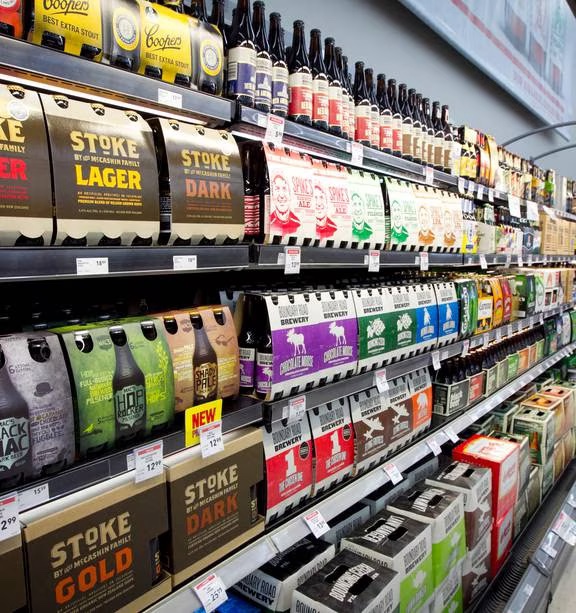
As interest in non-alcoholic drinks grows, major alcohol brands are making moves with sober versions of well-known products like Guinness and Tanqueray gin.
Experts say it’s a sign there’s still plenty of room for growth in the industry.
“If I was running an alcoholic beverage company … this is not a space that I would ignore,” said Joel Gregoire, associate director for food and drink at market research company Mintel.
Surveys in the U.S. and Canada show consumers, especially younger generations, are increasingly cutting back on alcohol consumption. With demand on the rise, the market is expected to keep growing.
While Mintel research shows around 15 per cent of Canadians 20 and older don’t drink at all, there’s another, likely much larger group of consumers that aren’t cutting out alcohol entirely, but cutting back — known as the “sober curious,” said Gregoire.
“When you’re trying to grow your brand with younger consumers, who are the ones who are generally most open to innovation … that’s where there’s a lot of opportunity,” he said.
Companies large and small are seizing on that opportunity. When Sarah Kate founded Some Good Clean Fun, a website covering and promoting non-alcoholic drinks and alcohol-free lifestyle content in April 2021, she said there were very few products on the market for her to drink, let alone write about.
“Since then, it’s just exploded,” she said.
Some big brands have offered non-alcoholic drinks for a long time, but they weren’t considered a selling feature, said Kate – it was a single non-alcoholic beer to capture a small part of the market that didn’t have other options. But now they need to do more.
“In the past two or three years, most of the innovation coming into the market in the non-alcoholic drink space has come from small brands,” she said, name-dropping Sobrii and HP Juniper as two Canadian brands leading the way.
Kate has also noticed a growing trend in acquisitions of these small brands, such as Keurig Dr Pepper buying the ready-to-drink non-alcoholic cocktail brand Atypique from a Quebec company.
And in 2019, Diageo, a multinational beverage company that includes Guinness, Baileys, Smirnoff and Tanqueray in its portfolio, bought non-alcoholic spirits company Seedlip.
“They’ve really got the edge,” Kate said of Diageo.
The company has launched non-alcoholic versions of several well-known products in the past couple of years, making a splash with the Canadian launch of its non-alcoholic Guinness this September.
It also launched a non-alcoholic Captain Morgan Spiced Gold this year, a non-alcoholic Tanqueray gin in 2021, and a non-alcoholic Gordon’s gin in 2020. (None of these are currently available in Canada, according to Diageo.)
They’re doing the smart thing,” said Kate. “They’ve done a ton of research into what works in a non-alcoholic format as well as what’s popular.”
The “sober curious” group is growing, especially among younger generations, said Diageo’s head of marketing for Canada, Nadia Niccoli. The pandemic seems to have accelerated this shift, she added, with more consumers looking for healthier options.
In 2021, a Statistics Canada survey found that one in five Canadians were drinking less than they did pre-pandemic, with younger Canadians more likely to be cutting back.
“This is something we’ve been working on for quite some time,” she said. “But the reality is that the rapid change in consumer habits has given us the opportunity to offer more versatility and come to market quicker, knowing that the demand is there versus us trying to create the demand back in 2017, 2018.”
In an industry where small producers have been pushing the envelope for years, big brands getting in on the action is a double-edged sword, said Kate.
Competition from beverage giants may make things harder for small brands trying to get market share, she said, but it also helps the whole industry grow.
Diageo isn’t the only well-known company expanding its non-alcoholic offerings.
Asahi last year launched Asahi Super Dry 0.0%, beginning in the United Kingdom and Ireland, and more recently in North America and other countries. In a press release last November, the company said its European and international arm wants 20 per cent of its portfolio to be alcohol-free products by 2030 “as the global market for alcohol-free beverages continues to soar.”
And in January 2022 Corona launched Sunbrew, which contains vitamin D (and of course, no alcohol).
Other companies have launched non-alcoholic drinks that don’t directly mimic their signature products, such as Roxie canned non-alcoholic cocktails from Molson Coors and Martini & Rossi non-alcoholic aperitifs.
It takes money and time to develop a good non-alcoholic drink, especially when you’re trying to replicate something that many people already know the taste of well. The work on Guinness 0 began in 2020, said Niccoli.
“These are multimillion dollar launches,” she said, from research to marketing the final product.
When brands launch non-alcoholic versions of their well-known products, they’re taking a big risk, Gregoire said. Connoisseurs of Guinness, for example, are likely to notice differences between the two drinks.
“This is a massive step from a big company,” he said.
“So this is really an interesting sign of where the industry is hedging its bets, if you will, and the risks that they are willing to take.”
This report by The Canadian Press was first published Oct. 26, 2023.



